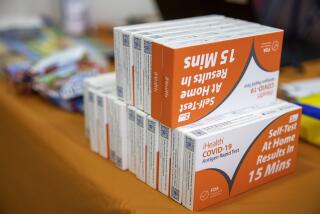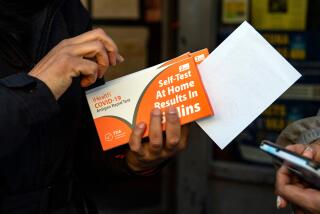Patients Can Improve Pap Test Reading
- Share via
The closure of Central Pathology Services Medical Group last week for allegedly misreading too many Pap smears not only sent doctors scurrying for other laboratories. The state order also left many women wondering how best to insure the accuracy of their test results.
Of course, no medical test is 100% foolproof. But the Pap smear--a routine test for the detection of cancer of the cervix and other medical abnormalities--presents special problems. Depending on the skills of the technologist screening a Pap smear and the physician obtaining the cell sample, false-negative rates can range dramatically. The best labs are said to have an error rate of 3% to 4%.
(According to the state Department of Health Services, Central Pathology Services Medical Group in Tarzana, which processed more than half of all Pap smears taken in Southern California, had an error rate of 21%. That figure is based on a March inspection of a randomly selected group of 1,103 tests.)
Part of the problem is the shortage of trained cytotechnologists who examine the cervical cells smeared on the Pap slide. State and federal officials have also been critical of labs that encourage speed over accuracy by paying technicians on a per-slide basis.
Still, physicians agree patients can reduce the chance of false readings by preparing for the test and following some common-sense but often overlooked guidelines.
--Get a Pap smear when you are between menstrual periods and avoid intercourse the night before the test, advised Dr. Jonathan Berek, a professor of obstetrics and gynecology and director of the division of gynecologic oncology at the UCLA Jonsson Comprehensive Cancer Center.
--Don’t use contraceptive jellies or foams for a few days before testing, and don’t douche for one week prior to prevent washing out abnormal cells, added Dr. Richard H. Nalick, director of gynecologic oncology at the Hospital of the Good Samaritan and a USC clinical associate professor of gynecologic oncology.
--If you suspect a vaginal infection, tell your doctor before the test, Nalick said, and if you are on antibiotic vaginal medications, postpone the test. Both infections and antibiotics can alter test results.
--Ask your doctor straightforward questions. Among those suggested by Berek and Nalick:
Do you use a reliable laboratory? How well do your laboratory Pap test results correlate with your clinical findings? How many slides do the cytotechnologists at your laboratory read per day?
The “ideal,” Nalick said, “is 30 to 50 a day per cytotechnologist. Sixty is maximum.”
Patients concerned by recent reports should telephone their physicians for advice, said Norm Hartman, spokesman for the Department of Health Services.
The state disagreed with 234 test results from the random sampling done at Central Pathology and ordered the lab to advise the patients’ physicians of the discrepancy, said Martin Cooper, laboratory spokesman. Those women are being offered retesting at no charge but they may need to pay for another office visit, said Hartman, explaining that the office fee is decided on a case-by-case basis.
The state also ordered the laboratory to notify all women who had a Class I Pap test (normal) in the last five years because those woman “may be living with a false sense of security,” Hartman said.
“We are in the process of trying to get clarification from the state about how they want us to do that,” Cooper said.
For most women, there’s no reason to panic, Hartman said. “There’s probably no rush (to get rechecked) unless you have a history of gynecologic problems. “
How often women should get a Pap test is a matter of debate. Last year, the American Cancer Society and several other medical organizations arrived at a consensus statement, advising women to begin annual Pap tests and pelvic examinations when they become sexually active or at age 18. After three or more consecutive normal tests, the Pap test may be performed less often, at the discretion of the woman’s physician, according to the guidelines.
“I would still recommend annual Pap tests for most sexually active women with more than one lifetime sexual partner,” Berek said.
If abnormal cells are detected, the next step should be a biopsy (tissue removal) taken with the aid of a colposcope, a special instrument that magnifies vaginal and cervical cells, Nalick said.
Problem Push-Ups
Done faithfully, push-ups can help perfect physique. But do them on the wrong surface, and you could be setting yourself up for “push-up palsy.”
That warning comes from two physicians at the Bowman Gray School of Medicine of Wake Forest University, Winston-Salem, N.C. After examining a man who performed 40 push-ups, three times daily on a hard, gymnasium-like floor, the physicians found the man had injured a nerve deep in one hand.
The nerve problem is also commonly found in cyclists and jackhammer operators, said Dr. B. Todd Troost, chairman of neurology, and Dr. Francis O. Walker, an assistant professor of neurology. Relief is simple: Switch to a softer surface like a carpeted floor.
But exercising on the wrong floor can be only part of the problem. Push-up buffs often have sloppy form, added Rodney Bassett, an exercise physiologist at Centinela Hospital’s Fitness Institute in Culver City. “Hands should be evenly spaced and you should strive for a fairly flat back,” he advised. Those who do modified push-ups from the knees should keep their thighs and upper body on the same plane, he added.
A Darn Sight Better
Nearsighted patients who undergo radial keratotomy seem to maintain good visual correction, according to a study in this month’s Archives of Ophthalmology.
“Five years after surgery, about 76% are 20/40 or better with uncorrected acuity,” said Ronald G. Marks, associate professor of biostatistics at the University of Florida, Gainesville. Evaluating 156 cases with Dr. Peter N. Arrowsmith of Nashville, 37% had 20/20 uncorrected vision, Marks said, and an additional 39% were between 20/25 and 20/40.
The study shows that “the surgery works reasonably well in carefully selected patients,” said Dr. James J. Salz, an associate clinical professor of ophthalmology at the USC Estelle Doheny Eye Foundation who also has studied radial keratotomy, in which incisions are made in the eye to correct nearsightedness.
Countdown to Health
Experts agree: early detection of high blood pressure, high blood cholesterol and breast cancer is good medicine. And this week consumers can take advantage of two local screening programs.
CountDown USA, a screening program for high blood pressure and high blood cholesterol, begins Wednesday. For more information about participating hospitals, call (800) 468-6842 from 5 a.m. to 9 p.m. Depending on location, the cost is $5 or free. The program is sponsored by the Voluntary Hospitals of America Inc.
The American Cancer Society’s annual low-cost mammography program, continuing through Sunday, refers women to 125 hospitals and radiology facilities throughout Southern California. Cost is $50 for eligible women--those 35 years or older who have not had a mammogram in the last 12 months and meet certain additional criteria. For information, call 772-8200 from the 213, 714 or 818 area codes.






